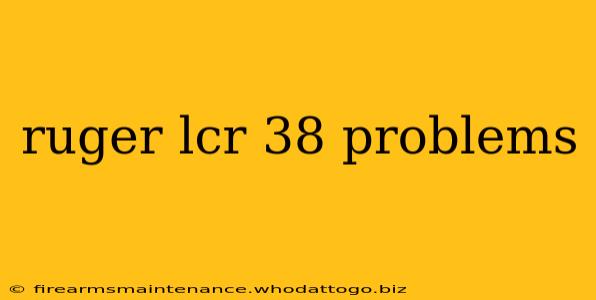The Ruger LCR .38 Special is a popular revolver known for its lightweight design and concealability. However, like any firearm, it can experience occasional issues. This guide will address common Ruger LCR .38 Special problems, offering troubleshooting advice and solutions to keep your revolver functioning reliably. We'll cover everything from malfunctions to maintenance tips, helping you become more familiar with your firearm and ensure its longevity.
Common Ruger LCR .38 Special Problems & Solutions
While generally reliable, the Ruger LCR .38 can sometimes present challenges. Let's examine some of the most frequently reported issues:
1. Light Strikes/Failure to Fire
This is arguably the most frustrating issue. A light strike occurs when the firing pin doesn't strike the primer with sufficient force to ignite the cartridge. Several factors could contribute:
- Weak Hammer Spring: Over time, the hammer spring can weaken, reducing its power. This often requires professional replacement by a gunsmith. Do not attempt this repair yourself unless you have extensive gunsmithing experience.
- Dirty Firing Pin: A dirty or obstructed firing pin can prevent it from fully impacting the primer. Regular cleaning is essential. Use a dedicated cleaning rod and solvent to thoroughly clean the firing pin channel.
- Ammunition Issues: Using substandard ammunition, particularly older or improperly stored rounds, can lead to light strikes. Always use quality, fresh ammunition.
- Improper Trigger Pull: A rushed or inconsistent trigger pull can result in insufficient hammer travel, causing light strikes. Practice proper trigger technique.
Troubleshooting: First, inspect the firing pin for cleanliness. If it's dirty, clean it. If the problem persists, consider having a gunsmith check the hammer spring. Switch to a different batch of ammunition to rule out ammunition problems.
2. Cylinder Binding/Rotation Issues
The cylinder's smooth rotation is critical. Issues here can stem from several sources:
- Dirty Cylinder: Dirt, grime, and unburnt powder can accumulate in the cylinder, hindering its rotation. Thorough cleaning is crucial.
- Damaged Cylinder Release: A worn or damaged cylinder release mechanism can prevent the cylinder from opening or closing smoothly. A gunsmith can diagnose and repair this.
- Weak Cylinder Spring: In rare cases, a weak cylinder spring might contribute to binding. Again, this requires professional attention.
Troubleshooting: Clean the cylinder thoroughly, paying attention to the ratchet and cylinder release mechanism. If the problem persists, seek professional help.
3. Recoil Issues/Excessive Recoil
The LCR's lightweight design can amplify recoil. While this is a characteristic of the gun, some users might find it excessive. This isn't strictly a "problem," but managing recoil is important for safety and comfort.
- Proper Grip: A firm, consistent grip is paramount to controlling recoil. Practice your grip to minimize felt recoil.
- Ammunition Selection: Heavier ammunition will naturally increase recoil. Experiment with different loads to find what's comfortable for you.
4. Timing Issues
This is a more advanced problem, typically requiring a gunsmith. Timing issues relate to the interaction between the hammer, cylinder, and firing mechanism. They usually manifest as misfires or inconsistent performance. Do not attempt to fix timing issues yourself.
Maintenance and Prevention
Regular maintenance is crucial for preventing problems. This includes:
- Regular Cleaning: Clean your Ruger LCR after each use, paying close attention to the cylinder, firing pin channel, and trigger mechanism.
- Lubrication: Apply a high-quality gun lubricant to moving parts.
- Inspection: Regularly inspect your firearm for any signs of wear or damage.
When to Seek Professional Help
If you're experiencing consistent problems with your Ruger LCR .38 Special despite troubleshooting, it’s crucial to consult a qualified gunsmith. They possess the expertise and tools to diagnose and repair more complex issues.
This guide offers general advice; always consult your firearm's manual and seek professional help when needed. Remember that firearm safety is paramount. Handle your weapon responsibly and always follow safe gun handling practices.

